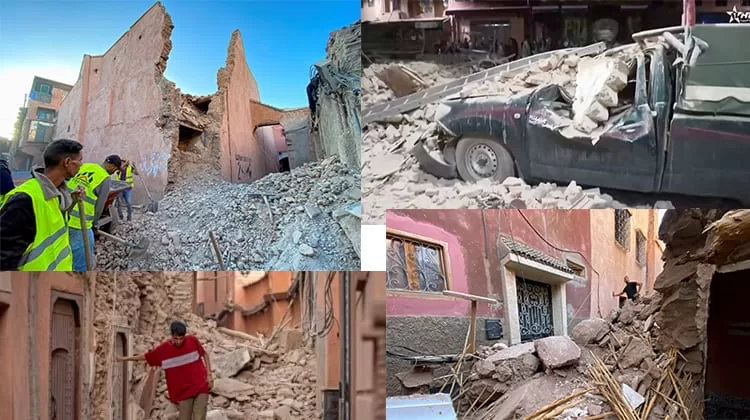Terrified Moroccan fled their homes in the middle of the night in Marrakesh following a powerful earthquake that shook the North African country. It left over 600 people dead.
A United States of America Geological Survey disclosed that the quake was about 6.8-magnitude, and struck a mountainous area 72 kilometres (45 miles) southwest of tourist hotspot Marrakesh at 11:11 pm (2211 GMT) on Friday.
Strong tremors were also felt in the coastal cities of Rabat, Casablanca and Essaouira.
Moroccan media reported it was the most powerful quake to ever hit the country.
“We felt a very violent tremor, and I realised it was an earthquake,” Abdelhak El Amrani, 33, told AFP by telephone from Marrakesh.
“I could see buildings moving,” said Amrani who went outside, joining many other people, “all in shock and panic. The children were crying and the parents were distraught.
“The power went out for 10 minutes, and so did the (telephone) network, but then it came back on,” he added. “Everyone decided to stay outside.”
Updated Interior Ministry figures on Saturday showed the quake killed 632 people, more than half of them in Al-Haouz and Taroudant provinces. The Ministry said deaths were, also, recorded in Ouarzazate, Chichaoua, Azilal and Youssoufia provinces, as well as in Marrakesh, Agadir, and the Casablanca area.
Another 329 people were injured, 51 in critical condition, the ministry said.
An eyewitness, Faisal Baddour, an engineer, said he felt the earthquake three times in his building.
“There are families who are still sleeping outside because we were so scared of the force of this earthquake,” he said. “It was as if a train was passing close to our houses.”
Frenchman Michael Bizet, 43, who owns three traditional riad houses in Marrakesh’s old town, told AFP that he was in bed when the quake struck.
“I thought my bed was going to fly away. I went out into the street half-naked and immediately went to see my riads. It was chaos, a real catastrophe, madness,” he said.
Bizet shared a video of piles of rubble from collapsed walls in the streets.
Other footage on social media showed part of a minaret collapsed on Jemaa el-Fna Square in the historic city.
An AFP correspondent saw hundreds of people flocking to the square to spend the night for fear of aftershocks, some with blankets while others slept on the ground.
Houda Outassaf, a resident, told AFP he was walking around the square when the ground began to shake.
“It was a truly staggering sensation. We’re safe and sound, but I’m still in shock,” he said.
“I have at least 10 members of my family who died… I can hardly believe it, as I was with them no more than two days ago.”
Fayssal Badour, another Marrakesh resident, told AFP the earthquake hit while he was driving.
“I stopped and realised what a disaster it was… The screaming and crying was unbearable,” he said.
The earthquake was also said to be felt in neighbouring Algeria, where the Algerian Civil Defence said it had not caused any damage or casualties.
In 2004, at least 628 people were killed and 926 injured when a quake hit Al Hoceima in North-eastern Morocco, and in 1960 a magnitude 6.7 quake in Agadir killed more than 12,000.
The 7.3-magnitude El Asnam earthquake in neighbouring Algeria in 1980 killed 2,500 people and left at least 300,000 homeless.
Discover more from The Source
Subscribe to get the latest posts sent to your email.








